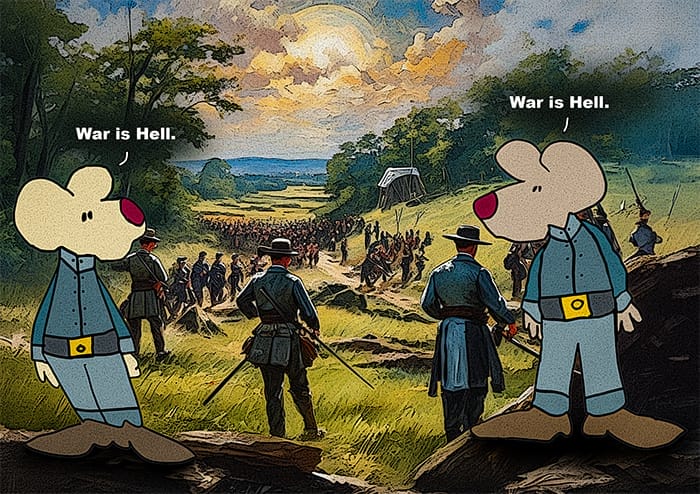There are a lot of wars happening in the world right now. And war is terrible.
The United States knows all about war.
The United States of America. Historically, we have stood united many times to fight against things that were wrong in the world. We have stood for “Freedom For All.”
So. As it has gone, the U.S. has been involved with twelve wars and many smaller conflicts since its independence from Great Britain.
Most of our wars have been against foreign powers. Yet, every so often, we fight amongst ourselves. There have been inner conflicts between Americans and Indians. And, of course, there was the Civil War, the fight between the Northern Union and the Southern Confederacy.
According to the “List of Wars” on Wikipedia, the United States has been in 108 wars. However, 12 of those have been considered great wars or major wars.
I’ve only been alive for three of these wars. Thankfully. I hope we do not see any more.
What are the 12 major wars in U.S. history?
the American Revolution
the War of 1812
the Indian Wars
the Mexican-American Wars
the Civil War
the Spanish-American War
World War I
World War II
the Korean War
the Vietnam War
the Persian Gulf War
the War on Terror (which encompasses the War in Afghanistan and Iraq War).
So. With all this fighting going on, I wondered if the U.S. had ever lost a war.
As it turns out, we have engaged in several wars that resulted in minimal gain or outright loss for the U.S. Some of these “lost wars” include conflicts like the War of 1812, the Korean War, and the Vietnam War.
Then, I wondered what the deadliest war in U.S. history might be. Well. It depends on how you look at it. As far as just “Americans” go?
Well, then, the Civil War was the deadliest war in American history. An estimated 360,000 American soldiers on both sides of the Union and Confederacy died on the battlefield.
But if you consider things “globally,” then World War II, which began in 1939 and ended in 1945, was the deadliest and most destructive war in history.
Death and loss. Those are two major themes in every war, no matter the date, time, or breadth of it.
But there is also much sacrifice. On many levels.
I started thinking about all of this because I was enjoying my coffee this morning. I was giving thanks for that cup of coffee and acknowledging how glad I was to have it. Then I thought about my parents. Specifically my mom talking about how coffee was rationed during WWII.
It happened on November 29, 1942. That was when coffee joined the list of items rationed in the United States. At the time, coffee production in Latin American countries was at an all-time high. So that wasn’t the problem. The problem came with the huge demand for coffee beans from both the military and the civilian population. And those big demands placed a bid demand on shipping. And there was the problem. Those shipping resources were needed for other purposes.
So, the government started rationing “stuff.” Stuff like coffee.
Rationing.
At first, limiting the use of certain products was voluntary.
One example? President Roosevelt launched “scrap drives” to try and collect rubber, like old garden hoses, tires, bathing caps, anything really. The U.S. needed rubber because Japan had captured the Dutch East Indies, a major source of rubber for the United States.
So people loaded up their cars and trucks and took their rubber collections to gas stations for a penny a pound. People gladly took part in the name of Patriotism.
But things got harder as the war wore on. Gasoline became a high commodity because oil tankers became increasingly vulnerable to German U-boat attacks. So, gas became the first resource to be rationed.
Starting in May 1942, in 17 eastern states, car owners were restricted to three gallons of gas a week. By the end of the year, gas rationing extended to the rest of the country.
Butter was another item rationed. Then coffee, sugar, milk, and so much more.
All together, about one-third of all food commonly consumed by civilians was rationed at one time or another during the war.
If Americans today were asked to cut back on anything in the name of Patriotism, I wager that a majority of the people would be critical and non-compliant.
We’ve become a nation of entitlement.
But more than that, we’ve become a nation divided.
There is no “American Way” anymore.
There have become two distinct and separate ways.
I can only hope that the good way, the way of Freedom for All, will prevail.
“””””””””””
“Patriotism is supporting your country all the time, and your government when it deserves it.” – Mark Twain
“””””””””””
“Patriotism is not short, frenzied outbursts of emotion, but the tranquil and steady dedication of a lifetime.” – Adlai Stevenson II
“””””””””””
“True patriotism hates injustice in its own land more than anywhere else.” – Clarence Darrow
“””””””””””
The truth of the wars. And now.
